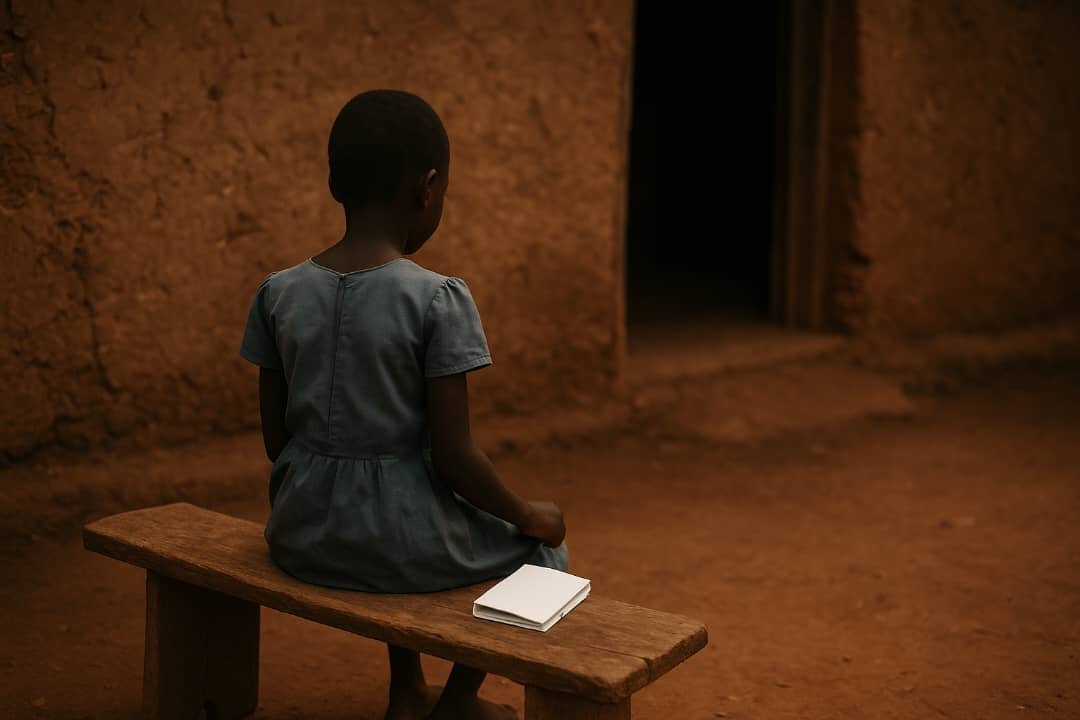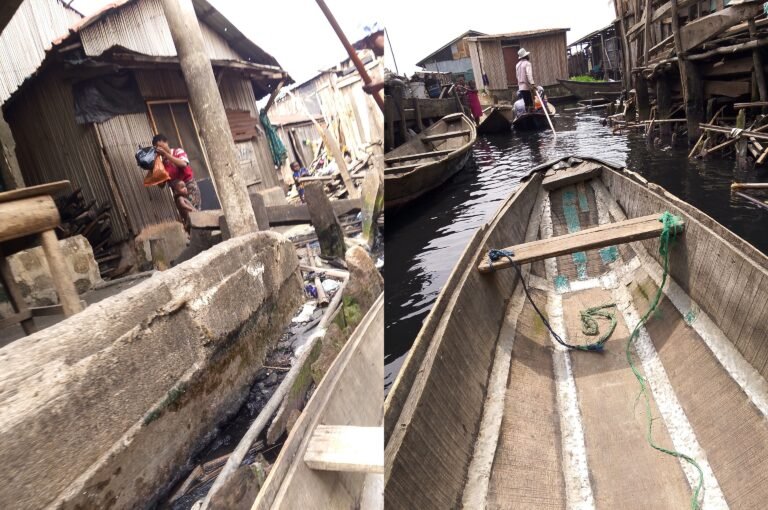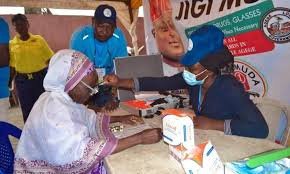
A young girl sits quietly outside her caregiver’s home in Shagev-Yav, Benue State. At twelve, she learned she was born with HIV — a virus passed to her at birth, one she never knew she carried.
BENUE, Nigeria – In the quiet traditional district of Shagev-Yav, nestled within Kwande Local Government Area of Benue State, a small girl with shy eyes and fragile limbs sits on a wooden bench, her feet barely touching the ground. Her name is Dooshima (not real name), and though she looks no older than five, she is twelve.
Her voice is soft when she speaks, almost uncertain. “I just want to go to school,” she says, eyes fixed on the red dust swirling outside. “I want to be like other girls.”
Shagev-Yav, bordered by Cross River State and the Republic of Cameroon to the southeast, is one of Kwande local government’s 16 traditional districts — a place where rolling hills and farmlands conceal stories of hardship and survival. Dooshima’s is one of them: a story of loss, silence, and strength. Gom Mirian, writes
A Childhood Interrupted
Dooshima lost her father when she was barely two years old. He had never gone to school and made his living from farming. When he died, the family’s fragile stability collapsed.
Her mother — once gentle and hardworking — began to change. Villagers whispered that “something went wrong in her head.” Some days, she wandered aimlessly; on others, she sat motionless for hours, humming songs no one understood.
That left Dooshima and her older brother, barely four and six, to fend for themselves.
“At their early age they would go into the forest to pick kolanuts and trek to Adikpo market to sell and get something to eat — even give their mother in her mental disorder state,” recalls Madam Nguana, a neighbour and mother of six who spoke to Africa Health Report.
“We villagers sometimes cooked and called them to come and eat, until the younger one was taken to the city.”
When a relative from her late father’s side offered to take Dooshima to the city to “give her a better life,” it seemed like salvation — the promise of school, food, and care after years of hunger.
A New Life, A Hidden Pain
In the city, Dooshima was enrolled in a public school. She loved the smell of new books and the sound of children reciting in class. But soon, her health began to decline. She was constantly tired, her appetite poor, and strange rashes began to cover her arms and legs.
When the rashes worsened, her teacher noticed. Out of concern for other pupils, she advised Dooshima’s caregiver to let her stay home until she recovered fully. That decision led to the truth.
Her caregiver took her to the hospital for a thorough diagnosis. The result came back a week later — positive for HIV.
“I was confused, weak, and speechless,” the caregiver recalls quietly. “When they handed me the result, I didn’t even know how to tell her. I told her the medicine was for the rashes until I could find the courage to explain.”
Eventually, she told Dooshima the truth — gently, in tears.
Her Mother’s Secret
During interviews with Africa Health Report, Dooshima’s stepbrother, Torkuma revealed the hidden past that shaped her fate.
“She never went for antenatal for her two children,” he said. “She delivered them both at home, and when it was later discovered she had HIV/AIDS, she already had the two kids. At first, it was only the boy that had the virus — the girl didn’t have it then.”
He paused before adding softly, “A lot of villagers now say her madness came from the virus.”
In rural Benue, where healthcare is limited, mother-to-child HIV transmission remains a persistent threat. Stigma and lack of access prevent many women from seeking antenatal testing or antiretroviral treatment.
A National Crisis Behind One Child’s Story
Data from the National Agency for the Control of AIDS (NACA, 2024) shows that despite Nigeria’s progress in HIV control, coverage for Prevention of Mother-to-Child Transmission (PMTCT) remains below 50 per cent. The shortfall results in about 22,000 new mother-to-child infections each year.
Nigeria now accounts for the highest number of new HIV infections among children globally — with one out of every seven children born with HIV in the world born in Nigeria.
“Dooshima’s case is tragic but not unique,” says a pediatric nurse at the Bishop Murray hospital in Makurdi. “Many women hide their status for fear of stigma. By the time we discover it, the children are already infected.”
The nurse who pleaded to remain anonymous, continued, “I am not surprised because her case is not the first or second, we have been recording children like this on a daily basis, unfortunately, there is nothing we can help them do at this point but advice they take their drugs seriously,” she added.
A Fragile Hope
Today, Dooshima takes her antiretroviral drugs daily — small white tablets that taste bitter but keep her alive. Her caregiver reminds her each morning: “Drink your water. Take your medicine.”
Her body is still frail, but her spirit is brightening. She has returned to school and sits in the front row, determined to learn. Her dream is to become a nurse someday — “so I can help people who are sick like me,” she says.
Her life is a delicate balance of resilience and fear, but she faces each day with courage beyond her years.
The Girl Who Still Dreams
Despite everything, Dooshima still smiles when she talks about the future.
“I want to finish school,” she says, her eyes lighting up. “Maybe one day, I will make people well again.”
Her story is one of quiet strength — a reminder that behind statistics are real children, carrying burdens too heavy for their age.
And though the world once looked away, Dooshima continues to fight — a little girl carrying not just her mother’s secret, but her own courage, one day at a time.
Editor’s Note: Names have been changed to protect identities.



